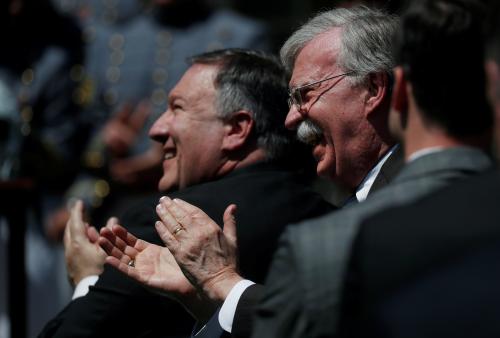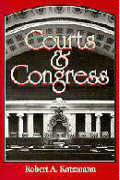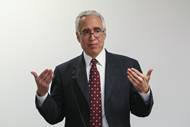The fight over John Bolton’s nomination as UN ambassador may yet produce a long needed debate about how presidents fill some of the toughest jobs in the world.
Like far too many appointees before him, Bolton won his nomination without regard to his leadership style. He also won the nod in spite of the quiet opposition of his most recent boss, former Secretary of State Colin Powell.
Bolton was nominated almost entirely on the basis of his loyalty to the president, his ideological intensity and membership in the professional class of appointees who await the next plum to add to their resumé. Having held four appointments under three Republican presidents, Bolton was named for the UN assignment largely because he was available, not because he had shown the leadership skills needed for such an important assignment. To the contrary, as Sen. George Voinovich (R-Ohio) said Thursday, his sometimes abusive behavior as undersecretary of state for arms control and international security would have earned him a pink slip in the private sector.
The question is how a candidate with a flair for intimidation made it so far. The answer will not be found in the 60 pages of forms Bolton filled out as part of the nomination process. Bolton had to list every address he has lived at in the past 15 years, every school he attended, every employer and supervisor, country of birth, citizenship of his mother, father, siblings (full, step, or half) and in-laws, all foreign countries he visited, including short trips to Canada or Mexico, any arrests, traffic fines of more than $150, illegal drug use and alcohol abuse dating back to age 18 and any psychological counseling he might have received.
But none of the more than 200 questions asked about Bolton’s definition of leadership, his approach to managing people, problems he might have had with subordinates, his commitment to public service, his definition of ethical conduct, or his own supervisory behavior. The only question that comes even remotely close to such issues is in the White House Personal Data Questionnaire, and it is nearly impossible to answer: “Is there anything about you or your family that would embarrass the president?”
The answer will not be found at the Federal Bureau of Investigation, which reviewed all Bolton’s answers, nor at the U.S. Office of Government Ethics, which searched his financial records for possible conflicts of interest. And it will not be found in the Senate Foreign Relations Committee questionnaire, which asks dozens of questions about policy, but none about leadership and management.
The reason Bolton made it so far without a yellow light is that the appointments process itself does not concern itself with leadership per se. Congress and presidents long ago decided that leadership is equal to the number of leaders, not necessarily the ability to lead. Toward that end, they have added layer upon layer of political appointees to the federal hierarchy in a vain effort to make government work. Whereas President John F. Kennedy appointed just 10 cabinet secretaries, 6 deputy secretaries, 15 undersecretaries, and 87 assistant secretaries, George W. Bush has appointed nearly three times as many people in those top categories.
As the numbers have grown, the ability to check each candidate has declined. The presidential appointments process is like a concrete pipe, meaning it can handle only so many nominees at a time. Nominees like John Bolton are perfect for the process. Having been vetted several times before, they arrive at the front end of the process with a presumption in favor of appointment. Who better to nominate for a top job than an appointee who has been confirmed four times before? Who better to send to the Senate than a nominee who has never raised questions before?
There was only one small obstacle in Bolton’s way: A senator named Voinovich, who happened to care a great deal about leadership. Having been a big-city mayor for 10 years and a state governor for eight, Voinovich also happened to worry about the future of the federal workforce, and Bolton’s impact as a tyrant.
No matter what happens to Bolton, Voinovich’s objection is likely to echo through the White House and Senate for some time. Perhaps it will even force an overhaul of the woefully antiquated appointments process by putting the focus on leadership, not the number of leaders.








Commentary
Op-edToo Few Questions on Bolton and Leadership
May 15, 2005